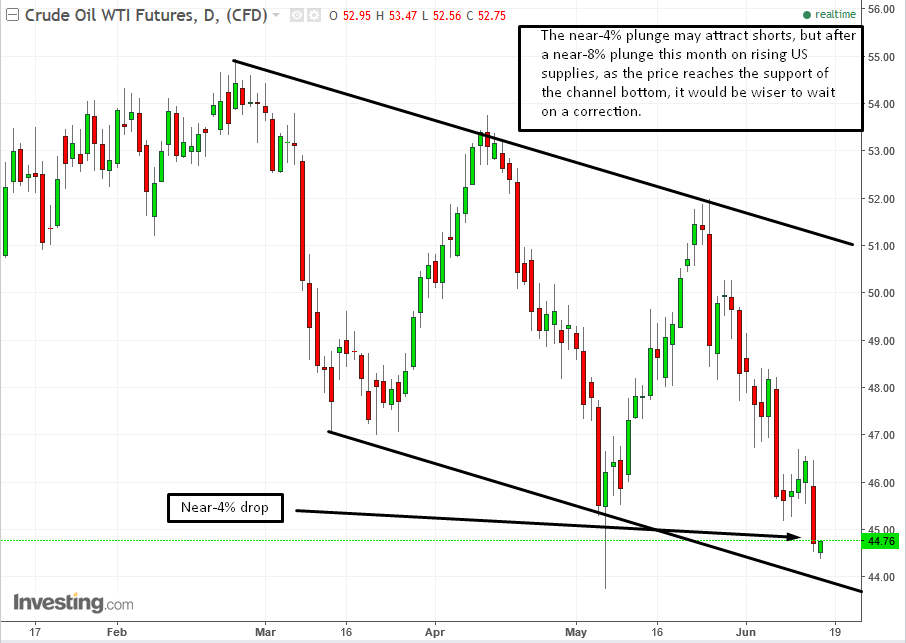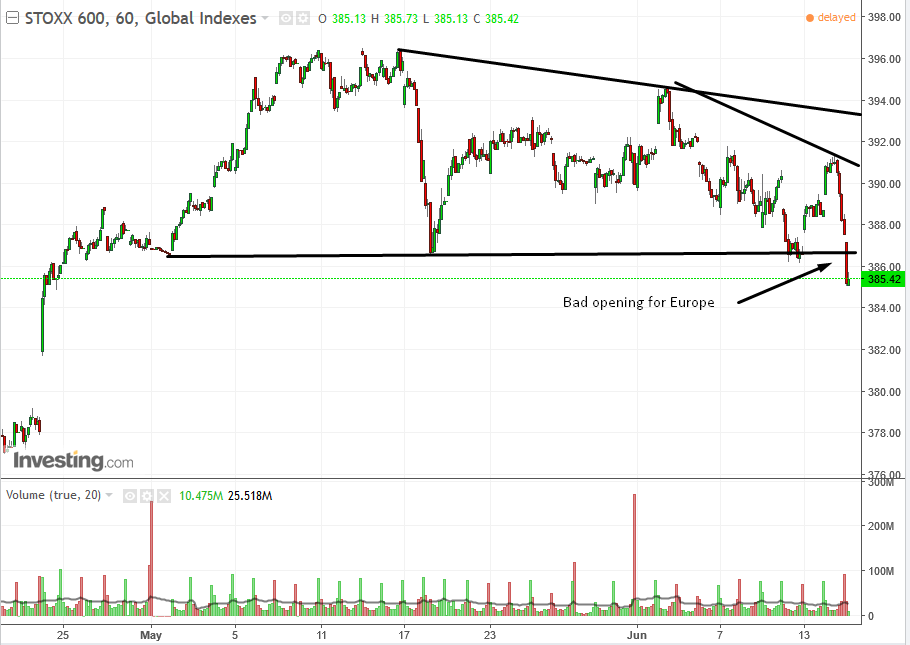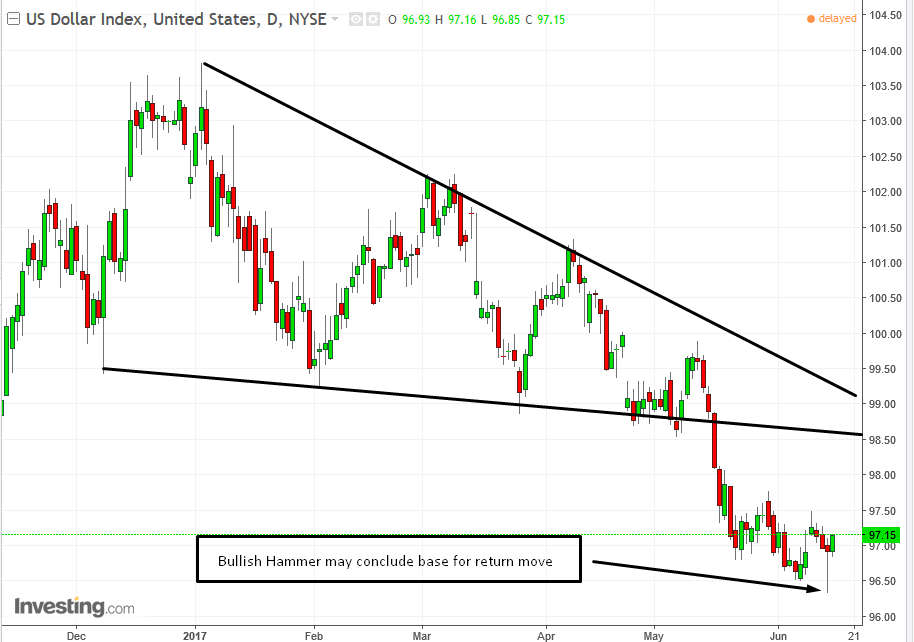by Pinchas Cohen
Key Events
- Global equities fall following decline in oil prices
- Treasury yields lowest since Trump Rally
Global Affairs
The global equity market is in retreat, led lower by banks even after they rebounded yesterday on Yellen's optimistic guidance surrounding rising inflation. Oil is another factor driving the sell-off. It's reached its lowest level since November. US futures are in retreat too, on reports that US President Donald Trump is officially under investigation for obstruction of justice.

Oil fell nearly four percent yesterday, spurred by data showing gas inventories rose by 2.1 million barrels in the week through June 9, contrary to expectations which were calling for of 457,000 barrels, as well as the International Energy Agency projecting an increase in non-OPEC production. Oil has declined almost 8 percent this month amid speculation that increasing US crude supplies will offset production curbs set in place by OPEC and its allies.
Per overwhelming consensus, the Fed raised rates yesterday by 25 basis points, its third hike in six months. They also maintained their outlook for one more rate hike this year, and even talked about starting to shrink the Fed’s monstrous $4.5 trillion balance sheet in 2017. While acknowledging the persistence of low inflation this year, Fed Chairwoman Janet Yellen remains confident about reaching the Fed’s 2-percent goal and is resolved to continue tightening rates in response to falling unemployment.
Even after the rate increase, in a blatant sign that investors are more willing to put their money on hard data rather than Fed rhetoric, today’s market’s are heavily impacted by the collapse in oil, as reflected in the drop in energy, raw-materials. As well, US consumer prices excluding volatile food and fuel had the smallest YoY gain since May 2015.
The biggest drag on the Asia-Pacific market this morning was energy energy and raw-materials, as oil traded below $45 and Australian bonds followed yesterday's Treasuries rally, after the release of the US's latest disappointing inflation read.
In the US, political risk still looms as a special counsel investigating the allegations that Russia meddled in the US election is set to question two top US intelligence officials. According to three people familiar with the matter, the two will testify on whether Trump asked for their help to stop the FBI from investigating former national Security Adviser Michael Flynn.
Up Ahead
- The Bank of Japan started a two-day meeting. While no change to monetary policy is expected, what investors want to know is whether BoJ Governor Haruhiko Kuroda will follow Yellen’s lead in talking about the outlook for inflation.
- Central bank week continues: With the current situation in the UK, i.e. Brexit and post-election turmoil, the country is too unstable for a rate change; Switzerland is expected to keep their policy unchanged.
- France is set to report on inflation and the UK will be releasing retail sales data.
Market Moves
Stocks

- Stoxx Europe 600 is down 0.56% to 385.41 and the Euro Stoxx 50 is down 0.93 percent to 32.95.
-
- S&P 500 futures dropped 0.39 percent to 2425.75 as of 4:17 EDT.
- The VIX rallied 3.47 percent to 11.93. The gauge fell 0.1 percent on Wednesday.
- The tech-heavy NASDAQ plunged 0.87% to 5,682.75 as of 4:20 EDT, on top of yesterday’s NASDAQ decline of 0.4 percent.
- Even the Dow Jones Industrial Average, which yesterday locked in a record close of 21,347.56, is down in the futures market 0.24% to 21,275.
- The DAX is down 0.52 percent to 12739.25.
- The FTSE 100 is down 0.63 percent to 7428.50.
- Japan’s TOPIX declined 0.2 percent.
- South Korea’s KOSPI lost 0.5 percent.
- Australia’s S&P/ASX 200 fell 1.2 percent. Financial shares tumbled; energy and raw-material companies dropped more than 2.2 percent.
- Hong Kong’s Hang Seng slid 0.9 percent to its lowest level since June 1.
- China's Shanghai Composite advanced 0.1 percent.
Currencies
- The yen fell less than 0.1 percent to 109.65 per dollar, after climbing 0.5 percent Wednesday.

- The US dollar gained some ground on last night's Fed guidance, up 0.33% at time of writing to 97.27, its lowest level since November.
- The Australian dollar jumped 0.4 percent after employment surged in May, led by a rebound in full-time positions, sending the jobless rate to its lowest level in more than four years.
- The New Zealand dollar fell 0.6 percent after data showed the economy grew less than expected in the first quarter as a rebound in dairy production was offset by a drop in construction.
Bonds
- The yield on 10-year Treasury notes rose one basis point to 2.14 percent, after dropping 8.5 basis points Wednesday to 2.13 percent, the lowest level since November.
- Australian benchmark yields lost 5 basis points to 2.36 percent, paring steeper declines after the jobs report.
Commodities
- West Texas crude futures fell less than 0.1 percent to $44.71 a barrel after dropping 3.7 percent the previous session as US gasoline inventories unexpectedly rose for a second week.
- Gold rose 0.1 percent to $1,262.10 an ounce, after sliding 0.5 percent the previous day, as investors weigh the probability of future US interest rate hikes.
